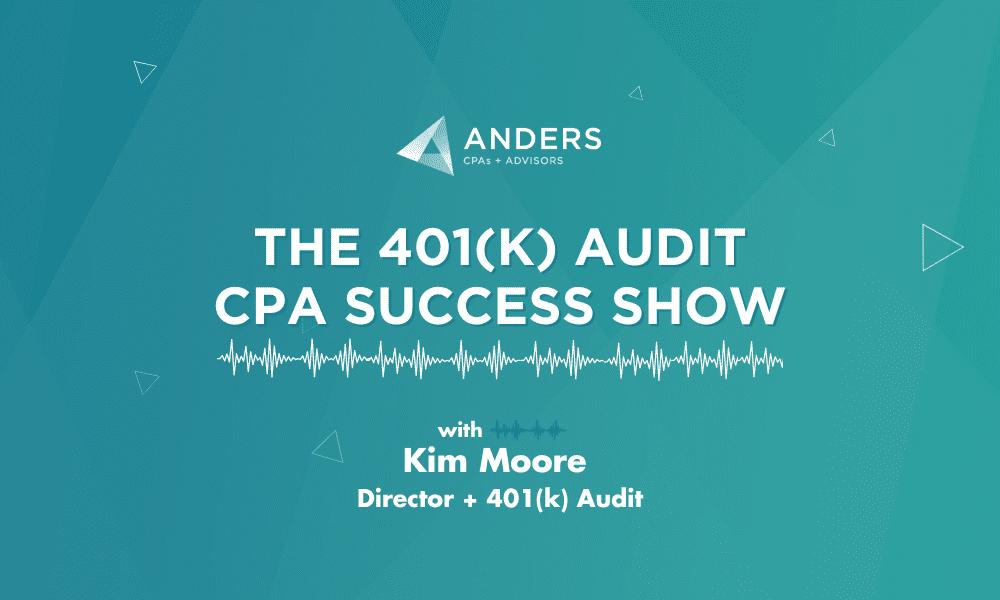The latest Department of Labor (DOL) Audit Quality Study reveals that 401(k) audits are increasingly specialized, requiring businesses to do due diligence before hiring an auditor. Doing so helps ensure your auditing firm has the experience and training necessary to complete employee benefit plan (EBP) audits with minimal errors. 401(k) audit director and practice leader Kim Moore, CPA, sat down with audit and assurance manager Karen Hill, CPA, on the 401(k) Audit CPA Success Show podcast to explain how the study will have a lasting impact on both businesses seeking 401(k) plan audits and auditors themselves.
Key Takeaways:
- Auditing firms that perform two or fewer employee benefit plan audits have a higher rate of deficient audits, 70%, than firms that perform 100 or more audits a year, which have an average error rate of 17%
- Firms that belong to the AICPA Employee Benefit Audit Quality Center, a voluntary organization, have the lowest error rates compared to their peers
The most deficiencies were found in audit areas that are more unique to employee benefit plan audits, such as participant data testing, contribution testing and distribution and participant loan testing.- Before signing on with a firm for an audit, be sure to ask questions that help you determine their experience level and evaluate their audit process
What is the Department of Labor Audit Quality Study?
The DOL, working with the Employee Benefits Security Administration (EBSA) and the Office of the Chief Accountant (OCA), performs an Audit Quality Study every few years to assess the level and quality of audit work performed by CPAs. The study randomly sampled 307 plan audits, divided between “simple” and “complex.” 401(k) and 401(b) plan audits were treated as “simple” for the sake of the study. “Complex” audits included health and welfare plans, Employee Stock Ownership Plans (ESOPs) and defined benefit plans.
Top Takeaways from the Audit Quality Study
In 2011, 5,203 firms performed five or fewer plan audits in a year while only 514 firms audited over 25 plans a year. In 2020, the number of firms performing five or fewer audits in a year shrunk to 2,589 while firms auditing 25 or more plans a year grew modestly to 555. What this tells us is that employee benefit plan audits are becoming increasingly specialized.
Previously, it was more possible to approach your regular CPA and request a 401(k) plan audit if your business needed it, but now a run-of-the-mill CPA firm may not have the specialization required to conduct efficient, error-free EBP audits. These days, firms may either no longer offer it as a service or concentrate entirely on EBP audits to take advantage of their specialty. To accommodate this shift, businesses seeking 401(k) audits and other EBP audits should understand how experience and audit volume affect error rates.
Non-Specialized Firms Had Higher Error Rates
Firms that performed 100 or more plan audits a year had lower average error rates, 17%, when compared to firms that only conduct two or less audits a year, 70%. The average error rate is 30% across all firms, which is still overly high in the DOL’s opinion, but is down from an error rate of 39% in 2015. More experienced firms have an overall lower error rate, even when taking into consideration the fact that these firms often perform more complex audits.
Certain Audit Areas More Susceptible to Error (H3)
Errors were more common in certain areas of audit that are more highly associated with 401(k) plan and other EBP audits. Some areas that saw the most errors include:
Participant Data Testing
Because it’s only relevant to EBP audits, auditors who lack EBP audit experience may be the reason why there were so many errors associated with participant data testing. It’s also very complex, increasing the chance that an auditor unfamiliar with these types of audits may make errors.
Contribution Testing
Auditors are required to test the timeliness of participant contributions and loan repayments to DOL requirements. This is a specific compliance requirement and an important part of a benefit plan audit. Auditors that don’t specialize in this type of work often miss this critical step. Failure to ensure all receivables are checked and that the total amounts of both employee and employer contributions make their way into the plan can often result in an error-ridden audit.
Benefit Payment Testing
There are unique tests that need to be applied to benefit payment testing. These include vesting, tax reporting requirements, approvals over hardship requests and other compliance requirements. Rules vary depending on the plan, its provisions and what type of distribution was requested, further complicating the matter. If a divorce, separation or death of a participant occurs, a new set of rules must be established and followed.
Internal Controls
Internal controls were another area high in errors. Benefit plan audits need to consider the processes and controls utilized by both the company sponsoring the plan and their service providers. It’s a requirement to fully understand the key controls related to each plan. Also, audit firms need to obtain and review SOC reports from the providers used by the plan as part of the audit. Firms must understand the concepts covered in these reports and document that understanding as part of the audit. Often firms obtain the reports but don’t fully review them. In addition, the complimentary user controls need to be evaluated and tested if they are applicable to the plan. This work must also be documented during the audit.
Risk Assessments
Risk assessments are crucial to an accurate audit. The DOL found many deficiencies in this area of the audits they reviewed. Ensuring the risk assessment is thorough, documented and consistent with the steps conducted in the audit are important to a successful audit.
Taking Steps to Improve Your Next 401(k) Plan Audit
Before engaging with an audit firm to perform your annual 401(k) audit, consider asking the following questions to help determine whether they have the appropriate experience:
- What is the firm’s overall experience level? Keep in mind that your specific auditor may not have much experience on their own, but their manager, supervisor or partners at the firm may, so inquire about the experience at various levels at the firm.
- Does the firm belong to the AICPA Employee Benefit Plan Audit Quality Center? This voluntary organization requires members to meet certain requirements and comply with ongoing education and, according to the report, members commit fewer errors than nonmembers. Also, ask if they use tools or other resources available through the organization.
- What training do auditors go through each year? With new audit standards, regulatory requirements and rules passed by Congress that impact plans, remaining educated about the overall status of employee benefit plans is vital.
If you need an audit for your 401(k) plan, learn more about our 6-phase 401(k) audit process or request a free 401(k) audit consultation below.
Watch the 401(k) Audit CPA Success Show: Lessons Learned from the Department of Labor Audit Quality Study on YouTube and subscribe on Spotify or Apple Podcasts and let us know what you think by rating and reviewing.


